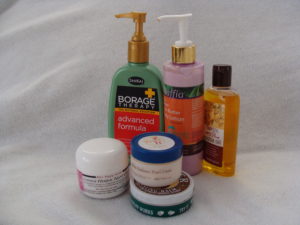It’s winter in Minnesota, and my skin is rebelling. My hands catch on everything I touch, and my skin itches in places that have no business itching. I slather on lotion and cover up my cracked fingertips in the hope that they will heal overnight.
The good news is that as soon as the humidity ramps up, the heat goes off, and I can open a window, my skin will be happy again. The bad news is that there are some people who deal with perpetually dry skin no matter the weather or time of year.
Is dry skin a big deal? Well, it can be if you consider that your skin is the largest organ in your body. Chronically dry skin can be a signal that something is going on deeper in your body. In Chinese medicine, your skin is related to your Lung organ system. While that may not make much  sense, remember your Lungs are considered to be the most exterior of your internal organs, because with every breath, the inside of your body comes into contact with the outside world. In addition, when you breathe on a mirror, you can see the moisture from your Lungs. So, as the keeper of all things external, the health of your Lungs can give off clues to the condition of your skin. For the clearest example of this, just look at the skin of heavy smokers. Enough said.
sense, remember your Lungs are considered to be the most exterior of your internal organs, because with every breath, the inside of your body comes into contact with the outside world. In addition, when you breathe on a mirror, you can see the moisture from your Lungs. So, as the keeper of all things external, the health of your Lungs can give off clues to the condition of your skin. For the clearest example of this, just look at the skin of heavy smokers. Enough said.
In Chinese medicine, there are a number of reasons your skin can dry out. As mentioned above, your environment can have a huge impact on the condition of your skin. Environment plays a role and living where it is dry, such as a Minnesota winter or the southwestern United States, can be a challenge. In addition, your skin dries out as you age–it’s a fact of life that most of us spend a lot of money trying to reverse.
Beyond aging and living in a dry place, there are a number of patterns in Chinese medicine that are associated with dry skin. Some causes include a change in hormonal status, recent illness, surgery, chronic dehydration, and not getting enough healthy oils in your diet.
The good news is that there are some fixes for your dry skin, especially if it is seasonal and superficial, and all of them are related to nourishing yourself. Among them:
–Use foods to nourish your skin from the inside. Healthy oils (olive, coconut, flax, fish, Evening Primrose, etc.) and oily plant-based foods, such as avocadoes and nuts are a good place to start. If you’ve been ill or have had a recent surgery, you may also need an herbal formula to help replenish your Yin and Blood, which act like nourishing coolants in your body.
-Moisturize your skin on the outside, too. As soon as you step out of the shower or tub, slop on moisturizer. It will seal in the moisture that you soaked up, and keep your skin protected from dryness for the entire day. My recommendation is to look for a really good skin cream that isn’t loaded with fragrance, parabens, and other harmful ingredients. If you’re unsure what to buy, check out the Environmental Working Group’s Skin Deep website for safety ratings of skin care ingredients.
-In a dry environment, add moisture to the air so it’s not drawn out of your skin. Use a humidifier, lots of plants, or even a shallow dish of water placed near your heat register.
-Avoid bathing in very hot water. No matter how good it feels in the cold, dark days of winter, very hot showers or baths strip the natural oils from your skin, making it dry and itchy.
-Avoid harsh, alkaline soaps. In fact, unless you’re particularly sweaty or dirty, you can get away with very little soap at all and still be squeaky clean.
-Drink plenty of water. While water won’t actually moisturize your skin, being chronically dehydrated will give your skin the appearance of being dry.
-If your skin is dry and flaky year round, accompanied by dry, brittle nails, and/or dry hair, you will likely need a little more help. Chinese medicine can offer a specific diagnosis plus acupuncture, herbs, and food therapy, and may be just what you need to change your skin from dry to glowing.



